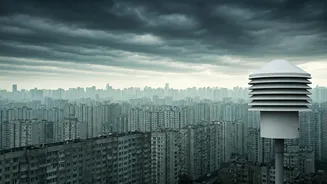Protest Gatherings Surge
Around 400 individuals participated in a recent protest in Delhi, demonstrating their opposition to the city's worsening air quality. The protesters, who
were wearing masks and holding banners, gathered to express their discontent. This collective action highlights the growing concern and frustration among residents regarding the environmental situation. The demonstration serves as a direct response to the increasing levels of air pollution that have become a pressing issue for the city's inhabitants. This organized protest suggests a rising awareness and willingness among the public to take action and demand improvements in the city’s air quality and overall environmental health. This is an effort to draw attention to the environmental crisis affecting Delhi's residents.
Pollution's Growing Threat
The protest highlights the severity of air pollution in Delhi, where the air quality has been consistently deteriorating. The increasing levels of pollutants pose a significant threat to public health. The presence of fine particulate matter, along with other harmful substances, contributes to respiratory illnesses and other health complications. The demonstrators' willingness to gather and protest underscores the urgency of addressing the environmental concerns. The event serves as a call for government action to combat pollution and implement measures that protect citizens. The worsening air quality has been linked to increased respiratory problems and other diseases, emphasizing the critical need for effective pollution control strategies. The protests aim to urge authorities to prioritize environmental protection and improve overall living conditions in the capital city of India.
Addressing the Challenge
To effectively tackle Delhi's air pollution crisis, a multifaceted approach is required. This involves identifying the primary sources of pollutants and implementing strict regulations and policies. These strategies should address sources such as vehicle emissions, industrial output, and construction activities. Enhancing public transportation networks and promoting the adoption of cleaner technologies are vital steps. Furthermore, raising public awareness regarding the impact of pollution is important. Education on the health risks associated with air pollution, along with encouragement of responsible environmental practices, is essential. The concerted effort to protect the environment and health of the people requires strong governance, community participation, and technological innovation. It is critical to address the immediate and long-term implications of Delhi's air quality crisis.
Impact and Solutions
The continuous presence of high levels of pollutants is damaging the health of Delhi's residents and causing environmental problems. In response, implementing comprehensive air quality management programs and strategies is necessary. This includes steps such as monitoring pollution levels, identifying emission sources, and adopting appropriate mitigation measures. The government must introduce incentives to encourage the usage of electric vehicles and promote cleaner industrial practices. In addition, strengthening the infrastructure for waste management can help minimize pollution. Enhancing environmental awareness and public cooperation also play a critical role in finding sustainable solutions. Addressing Delhi's air pollution crisis requires combined efforts from government, businesses, and communities to safeguard public health and build a healthy and sustainable urban environment for all citizens.




















